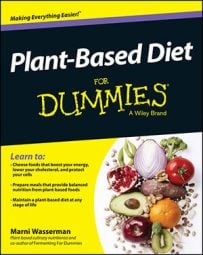When you’re immersed in the world of plant-based eating for a bit of time, grocery-store shopping may begin to lose its appeal. You may find yourself wanting to set foot instead on alternative ground, which is actually now becoming more mainstream. Shopping at places like farmers’ markets and health-food stores or getting involved with a local community-supported agriculture (CSA) service will likely become your new terrain for shopping.
Why? First, the diversity of products that fall within your new plant-based standards are boundless in these locations (although you still have to be a discerning consumer, as organic cheeses and the like still aren’t healthy snacks).
Also, at places like farmers’ markets, you get access to some of the freshest produce. Not to mention, when you shop at places like these, you support smaller businesses that typically have as much interest in your health as they do in making a sale. All around, you feel better about your choices.
Farmers’ markets
Farmers’ markets have popped up everywhere. They’re a gathering of local vendors and farmers offering produce (and sometimes other fresh items) for direct sale to consumers. They usually happen weekly in a public place, such as a park or community center, and are typically busy. You won’t find everything of a certain category in one place like you do at a grocery store. Every vendor has something different to offer.
The main benefit of farmers’ markets, aside from all the food being extremely fresh, is that you get the chance to talk to the farmers about their products. They can tell you all about your new find, how to prepare it, and where exactly it came from. You can even ask about the growing methods, such as what pesticides were used (if any) and when it was harvested.
Community-supported agriculture (CSA) programs
This is a program in which consumers purchase annual or seasonal shares in farmers’ land and receive fresh, seasonal produce from that farm in exchange for their monetary investment. In some cases, you pre-pay before the growing season. In other cases, you pay weekly for a delivery or pick up your share at a designated meeting place.
An evolution is occurring away from single-farm CSAs to multi-farm CSA services that give customers a wider variety of foods and more choices (which can sometimes be customized online). This is a nice way to get produce and sometimes other specialty goods without having to fight traffic in the parking lot (or aisles, for that matter).
CSAs are an especially helpful service to use when you’re just starting out on a plant-based diet because the produce is sometimes selected for you (which can feel way less intimidating than trying to pick out your own stuff at the store). It’s a great way to learn about different fruits and veggies and when they’re at the height of their freshness. You can likely find CSAs in your area by doing an online search.
Health-food stores
Every major city — and most smaller ones — have at least a few health-food stores. You can typically find a whole slew of smaller, privately or family-run businesses that are committed to stocking good-quality products, clean packaged products, and nutritional supplements.
Health-food stores are typically much smaller than supermarkets, so it’s much easier to find what you’re looking for, which makes them convenient and easy places to stock up. You may also get to know the owners well, making it likely that they’ll order things in for you by request or make other special arrangements with you if needed.
Either way, shopping experiences at health-food stores are typically a lot smoother and more enjoyable than shopping at conventional grocery stores.
Just because you’re in a health-food store doesn’t mean that the staff are qualified to give nutritional advice or well-versed in the potential side effects of supplements. You need to be an educated consumer even in a health-food store.

